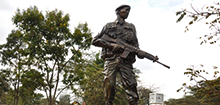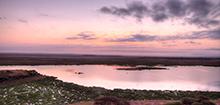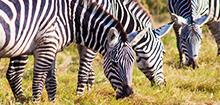
Date Published: 04 Mar, 2015
The Canadian High Commissioner to Kenya HE Mr David Angell this morning presided over the graduation of 42 Kenya Wildlife Service rangers after training in first aid.
The rangers have completed a two-week advanced first aid training course, the first of its kind in East Africa, thanks to support by the Canadian government.
Mr Angell noted that Canadians, like Kenyans, had a deep connection with wildlife and their land and had declared wildlife crime a serious crime through legislation since 2009.
The ceremony, attended by KWS deputy director Ben Kavu and Edwin Wanyonyi as well as Tsavo Assistant Director Robert Obrein was held at the Kenya Wildlife Service Law Enforcement Academy, Manyani, in Tsavo West National Park.
Mr Wanyonyi said the training was a celebration of KWS Strategic Plan thematic areas of people excellence and collaborative partnerships and would support the other pillar of conservation stewardship.
Mr Kavu said KWS does not believe in sheer numbers of rangers but had placed premium on specialized units such as marine, mountain search and rescue as well as the canines.
A total of 420 officers are earmarked for the two-week intensive training through the sponsorship of the Canadian government under the US$ 2 million Global Peace and Security Fund to support anti-poaching efforts in Kenya.
The advanced training has equipped the KWS frontline officers with the necessary skills and provided first hand response to trauma during emergencies such as injuries from bullet wounds in fire exchange with poachers, drowning while on patrol and attacks by wildlife.
The course has been jointly conducted by KWS and the Kenya Red Cross. The trainees displayed the skills they had acquired in resuscitation, managing an injured ranger and protecting them from further injury while in combat situations.
Most of wildlife conservation efforts are usually labour-intensive, with rangers having to physically manage the wildlife and only use of air patrol to supplement such efforts. The threat posed by well-armed poachers to wildlife and rangers has grown in sophistication. Other dangerous circumstances where such skills are required include animal attacks and drowning.
According to names on the Conservation Heroes Monument roll of honour, KWS has lost over 65 officers while in line of duty arising mainly from gunshots, drowning and attacks by wildlife. Some of the officers’ lives would have been saved if only the accompanying officers had the necessary skills to administer first aid. Therefore, the training is expected enable KWS officers deal with preventable deaths as well as give morale to rangers working in dangerous conditions.
Beyond the training, the support by the Canadian Government includes provision of protective and night vision equipment, and equipping of the forensic laboratory to boost prosecution of poachers and smugglers of wildlife and wildlife related products. The ultimate goal of the Canadian Government support is to ensure that KWS modernises its security operations, systems and troops deployment working with community rangers around national parks and other wildlife areas.
The support is designed to ensure that the troops and field operators have adequate intelligence, use modern equipments and embrace the latest and appropriate technology in their day to day operations to achieve high standards of performance, as well as stop any further poaching incidents. By multiplier effect, this would deter poaching gangs that survive on this trade.





